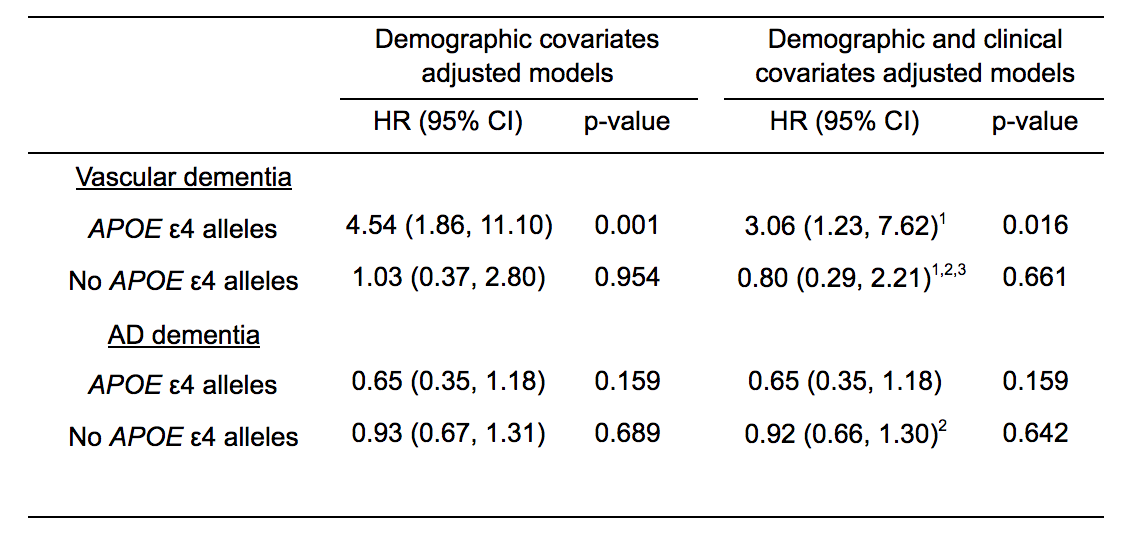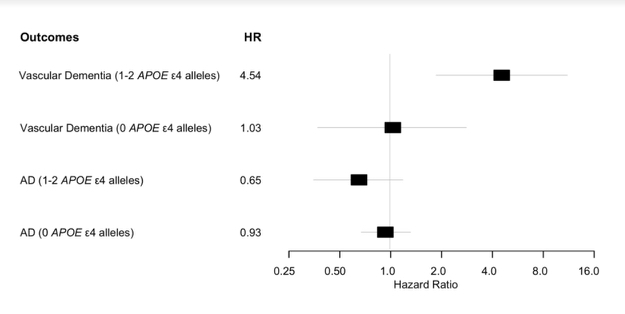In this study published in the Journal of Alzheimer's Disease, Dr. Cecilia Lee and her co-authors investigated whether retinal artery and retinal vein occlusions are risk factors for developing dementia. Retinal vascular occlusions are associated with aging and can reflect systemic vascular changes related to diseases like hypertension and cardiovascular disease, changes that may also be occurring in the brain. Vascular pathology is already known to be an important risk factor for Alzheimer's disease and related dementias. Dr. Lee wondered if retinal vascular occlusion might be a harbinger for problems with cognition down the line.
To investigate, the authors used data from the Adult Changes in Thought study, in which older adults are followed over time to see if they develop any signs of dementia. If they participants demonstrate a decrease in score on their biennial cognitive testing, they undergo extensive further testing to determine what is causing the cognitive decline. Eventually they may receive a diagnosis of Alzheimer's disease, vascular dementia, or another type of dementia. The authors looked at participants in the study who had a retinal vascular occlusion before any changes in cognition occurred, and then compared them to participants who had never had a retinal vascular occlusion, to determine if those who had retinal vascular occlusions were more likely to go on to develop dementia.
They found a surprising result: those participants who had a retinal vascular occlusion were more likely to have one particular type of dementia, vascular dementia. But this was only true in those participants who also had the APOE e4 allele, a gene that is known to be associated with increased for Alzheimer's disease. Interestingly, participants with retinal vascular occlusion and the APOE e4 allele did not appear to be at higher risk for Alzheimer's disease.

None of the other potential demographic and clinical factors, including existing eye disease, that the researchers investigated showed any effect on cognition outcomes. Retinal vascular occlusions are relatively uncommon, and this study relied on diagnostic insurance codes to determine the diagnosis of retinal vascular occlusion, so the authors note that further studies are warranted. The study population is very well-characterized in terms of dementia diagnoses, however, which is a strength of the study, enabling the differentiation of outcomes between vascular dementia and other types. The results suggest that older dementia-free individuals who present with retinal vascular occlusion may be at risk for developing vascular dementia, particularly if they have at least one APOE e4 allele. These individuals may also be at risk for other vascular diseases, even if they do not already have known risk factors.
Lee CS, Lee ML, Gibbons LE, Yanagihara RT, Blazes M, Kam JP, McCurry SM, Bowen JD, McCormick, WC, Lee AY, Larson EB, Crane PK. Associations between retinal artery/vein occlusions and risk of vascular dementia. J Alzheimers Dis. 2021 Mar 15. doi: 10.3233/JAD-201492. Online ahead of print.

